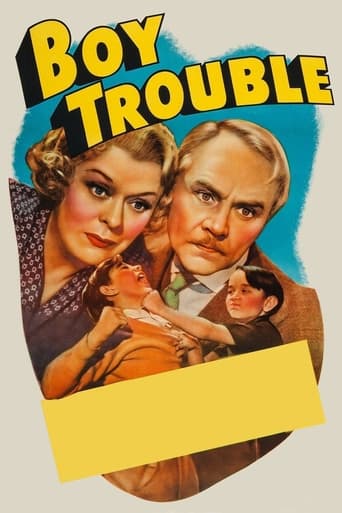tavm
This is the second Donald O'Connor movie I'm reviewing in chronological order. He's one of the orphans (the other being Billy Lee) being adopted by Charles Ruggles, who's had to deal with bratty boys at his clothing store so he's not so tolerant at first. But his wife-Mary Boland-immediately loves them. I'll just stop there and just say there's some funny scenes with Ruggles and some of those bratty boys at the store but also some touching scenes especially concerning little Billy. O'Connor himself has a charismatic toughness about him as the near-teen one. So on that note, Boy Trouble is very much recommended for anyone with a taste for the obscure old movies. P.S. Besides Lee who was in Mike Fright, other players who were in Our Gang shorts include Sonny Bupp who was in Men in Fright and Zeffie Tilbury who was in Second Childhood. And, since I always like to cite anyone from my favorite movie-It's a Wonderful Life-in other films, here, it's Sarah Edwards-Mrs. Hatch there-as one of the neighbors here.
mark.waltz
That's the lesson that department store employee Charlie Ruggles learns when his wife Mary Boland suddenly takes in a young boy for a "trial run" after coming to the apparent conclusion that the reason that Ruggles dislikes young boys is because he never had to raise one. He's had nothing but obnoxious bratty boys as customers with their equally obnoxious mothers in the boy's clothing department he was transfered to against his will. "How long as that clerk worked here?" one mother asks. "Eleven years", she is told, to which she replies "Why?".Not amused by the addition to his household by this well-mannered young boy (Billy Lee, alias "Nick Charles Jr."), Ruggles prepares to take him back, and on their way to the orphanage, he accidentally hits a slightly older tough kid (Donald O'Connor) whom he agrees to take in out of a slight guilt complex. Predictably, Ruggles comes to love these youth as if they were own, and when the orphanage finds another home for young Lee, Ruggles fights to keep him.The first half is amusing and comical, the second half dramatic and sentimental. Ruggles is truly hysterical in the humorous half, dealing with the brats in his store with pure vile. To see the transition of this character isn't like watching another W.C. Fields; Young isn't mean spirited, just not an expert in the art of raising a son. Boland's voice at times is a bit hard to take. In large doses, she sounds like she's eternally congested. But to see this beloved team together is as amusing as the Wallace Beery & Marie Dressler pairing was, although they are certainly much more sophisticated. To see the young O'Connor is a real treat for fans of the "Francis" movies and "Singin' in the Rain". He's one of the few child stars who transfered from youth to teen to adult with little or no effort. Lee, too, is excellent, a bit too sweet at times to be believable, but like his relationship with Ruggles, he'll certainly grow on you.
lugonian
BOY TROUBLE (Paramount, 1939), directed by George Archainbaud, might sound more like a Warner Brothers social drama dealing with a rebellious youth causing trouble in a reform school, but in fact, is a heartwarming comedy-drama centering upon the trials and tribulations of a middle-aged couple, Homer and Sybil Fitch, as enacted by Charles Ruggles and Mary Boland, a popular couple of fine screen chemistry that started in 1932.As for the plot, Homer C. Fitch (Ruggles), a storekeeper and family man with a wife (Boland) daughter, Patricia (Joyce Matthews), and an adopted son, "Butch" Smiley (Donald O'Connor), decide to take in another orphan, Joey (Billy Lee) with the possibility of adopting him. Homer proves himself the perfect father when devoting all his time to Joey after he becomes seriously ill. As for Butch, the pre-teen agrees to let Homer become a member of the "Golden Arrow" boys club. However, trouble links into the Fitch household when Homer, in a fit of anger, socks Mr. Snively (Andrew Toombes), his employer, causing him to lose his position and his chances of keeping Joey when news of this incident reaches the adoption agency.The supporting cast features John Hartley as Wyndham "Windy" Wilson, Patricia's love interest; Zeffie Tilbury as Mrs. Jefferson; and Dick Elliott as Doctor Benslinger, among others.This long forgotten programmer was a typical time filler in theatrical houses at the time, and not a bad little film at that. BOY TROUBLE was to have been the start of a proposed movie series, following the tradition of MGM's Hardy Family ("Andy Hardy"), Republic's Higgins Family, and Columbia's Bumstead Family ("Blondie"), but after only two installments, the second and much better being NIGHT WORK (1939), the series came to a close.In spite of Mary Boland's name heading the cast, the story is devoted more to the second billed Charlie Ruggles. A fine character actor of numerous diversified roles, it is his performance that carries on the film. Little Billy Lee and Joyce Matthews would appear in other motion pictures before fading away from the Hollywood scene, but of the youths, only Donald O'Connor's career succeeded the longest, through adulthood in films, television and night clubs performances.BOY TROUBLE, which runs at 66 minutes, is fine family viewing, especially those who enjoy old-fashioned entertainment such as this, but sadly this had been out of circulation on the television markets since the mid 1970s, and may never be seen again, but to know and love the wonderful team of Boland and Ruggles, watch the old video releases of SIX OF A KIND (1934) and/or RUGGLES OF RED GAP (1935). (**1/2)


